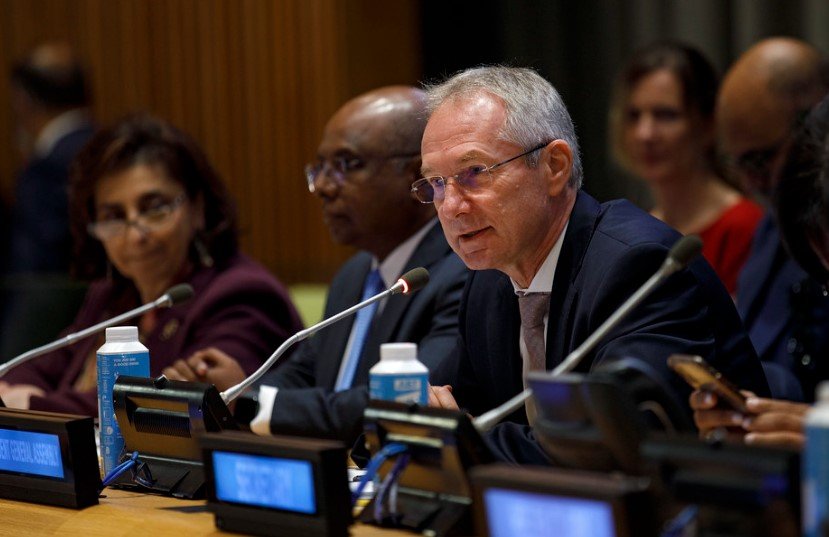Arab leaders at the United Nations General Assembly in New York strongly criticized Israel’s actions in Gaza, while US President Donald Trump firmly opposed recognizing a Palestinian state. This happened during the 80th session on September 24, 2025, highlighting deep global divisions over the ongoing conflict and calls for peace.
Arab Leaders Voice Strong Criticism
Qatar’s Emir Sheikh Tamim bin Hamad Al Thani accused Israel of choosing war instead of freeing hostages and expanding settlements in Gaza. He called Israel’s strike on Hamas leaders in Doha a clear violation of sovereignty and an act of state terrorism.
King Abdullah of Jordan warned that Israel’s talk of a Greater Israel could harm neighboring countries’ borders. He spent most of his speech denouncing Prime Minister Benjamin Netanyahu’s policies, saying they threaten regional stability.
Turkey’s president and UN Secretary General Antonio Guterres also condemned Israel. Yet Indonesia’s leader balanced his remarks by stressing Israel’s right to security and ending with a Hebrew blessing for peace.
These speeches came amid growing international pressure on Israel to end its military operations in Gaza, which have caused widespread destruction since the conflict escalated.

Trump’s Firm Rejection of Palestinian Statehood
President Trump spoke a day earlier, rejecting moves by European nations to recognize Palestine as a state. He argued that such recognition would reward Hamas for attacks, including the October 7 incident, and ignore the need to free hostages first.
Trump called for a united front to demand the immediate release of hostages. His words drew applause from many delegates, showing support for his tough stance against what he sees as ransom demands by militants.
He also addressed Iran’s role, labeling it the top sponsor of terror worldwide. Trump noted that US forces destroyed Iranian nuclear sites in June 2025 during a short war, vowing to block Iran from ever getting nuclear weapons.
This position aligns with Trump’s broader Middle East policy, which favors strong ties with Israel and pressure on groups like Hamas.
Global Reactions and Divisions
Leaders from Saudi Arabia, the UAE, Egypt, and others met with Trump on the sidelines to discuss ending the Gaza war. They pushed for a ceasefire, hostage releases, and a path to Palestinian statehood, but Trump stood firm against quick recognition.
Posts on social media platforms reflect mixed sentiments. Some users praise Arab leaders for speaking out, while others back Trump’s view that statehood now would encourage more violence.
- Qatar and Jordan highlighted Israel’s strikes as acts of aggression.
- Turkey urged an end to occupation.
- Indonesia called for mutual security respect.
These reactions show a split, with Western allies like the US and Israel isolated on some issues, as seen in recent UN votes demanding a halt to military actions.
Impact on Gaza and Regional Stability
The Gaza conflict has displaced millions and destroyed much infrastructure since it began. Recent reports estimate over 40,000 deaths, with efforts to rebuild stalled by ongoing fighting.
Trump’s plan for Gaza includes US involvement in stabilization, but Arab nations want an international force instead. This debate could shape future peace talks.
A potential two state solution faces hurdles, including opposition from Netanyahu, who rejects Palestinian statehood outright.
Experts say without hostage releases and a ceasefire, tensions will rise, affecting trade routes and energy supplies in the Middle East.
Key Positions in the Debate
To clarify the stances, here is a table summarizing major players’ views:
| Country/Leader | Stance on Israel | View on Palestinian Statehood |
|---|---|---|
| Qatar (Emir Tamim) | Condemns strikes and settlements | Supports recognition for peace |
| Jordan (King Abdullah) | Warns of territorial threats | Pushes for two state solution |
| US (President Trump) | Backs Israel’s security | Rejects as reward for terror |
| Turkey | Criticizes occupation | Demands end to Gaza war |
| Indonesia | Respects Israel’s rights | Calls for balanced security |
This table shows the range of opinions, from strong criticism to calls for dialogue.
Path Forward Amid Tensions
Discussions at the UN suggest more meetings ahead, with Trump planning talks with Arab leaders on Gaza’s future. Some propose a UN mandated force to oversee rebuilding and security.
Yet challenges remain, including Iran’s influence and Hamas’s control in parts of Gaza. Logical next steps involve mediated negotiations to free hostages and stop fighting.
Recent events, like the brief Israel Iran war in June 2025, add urgency to finding lasting solutions. Analysts predict that without compromise, the region could see more unrest.
What do you think about these developments? Share your thoughts in the comments and spread the word to keep the conversation going.
